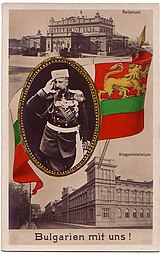This is an old revision of this page, as edited by Serbia123 (talk | contribs) at 19:15, 25 January 2010 (But it wasn't. The battle itself was fought by Serbs and French.). The present address (URL) is a permanent link to this revision, which may differ significantly from the current revision.
Revision as of 19:15, 25 January 2010 by Serbia123 (talk | contribs) (But it wasn't. The battle itself was fought by Serbs and French.)(diff) ← Previous revision | Latest revision (diff) | Newer revision → (diff)| Battle of Dobro Pole | |||||||
|---|---|---|---|---|---|---|---|
| Part of the Balkans Theatre (World War I) | |||||||
| File:DobroPole.jpg Two Pronged Allied Offensive | |||||||
| |||||||
| Belligerents | |||||||
|
|
| ||||||
| Commanders and leaders | |||||||
|
|
| ||||||
| Strength | |||||||
|
26 battalions 146 artillery guns at the end |
75 battalions 580 artillery guns | ||||||
| Macedonian front | |
|---|---|
The Battle of Dobro Pole was a World War I battle, fought on September 15, 1918. The battle resulted in a decisive Entente victory, with a defeated Bulgaria left to sign an armistice, which removed it from World War I.
The battle was fought at Dobro Pole, in present day Macedonia, which was claimed by Bulgaria and had been under Bulgarian occupation since 1915.
Prelude
Once the Bulgarian advance into Greece had been halted, conditions at the front deteriorated rapidly and political support for the war began to wane. Bulgaria had now achieved all its war aims, but was compelled to continue fighting in order to assist its Central Powers allies. With little manpower available for farming, serious food shortages affected both civilians and soldiers while rampant inflation damaged the economy. In 1917 food riots broke out and opposition to World War I propaganda became widely circulated.
On June 17, 1917, Greece joined the war on the side of the Entente (having issued a declaration of war on 23 November 1916). In September 1918, the Entente forces launched a two-pronged offensive into Bulgarian-occupied Macedonia.
Bulgaria was able to defeat Britain and Greece at the Battle of Doiran, but Serbo-French forces did not halt their advance, and the two forces finally met at Dobro Pole.
The battle
Bulgarian forces met a more powerful and larger army at Dobro Pole. The large majority of the Allied Powers consisted of 122nd French Infantry Division, 17th French Infantry Colonial Division and the Serb Shumadia Division in the first echelon and two Serbian divisions in the second echelon (Timok and Yugoslav). The battle started on 14 September with great artillery bombardment. Bulgarians prided themselves in not having lost any battles up to this point in the war, and Ferdinand I decided to stay and fight. The machine gun companies, the 2nd and 3rd Bulgarian Infantry Divisions dug in. From 15 September to 21 September, the Bulgarians were surrounded. Outmanned and strategically inert, the Bulgarians were unable to stop the Allied advance. Even when asked to surrender, as victory was hopeless, the Bulgarians refused to give up, ignoring the Allied requests. The Allies continued to advance, and eventually their flamethrowers inflicted devastating damage upon the Bulgarians, who soon were soundly defeated.
Revolt
After the defeat at Dobro Pole, other Bulgarian soldiers began to revolt, and the Bulgarian front lines were abandoned. The rebels headed towards Sofia in order to negotiate with the government. When the rebels reached Sofia, they were crushed by Bulgarian loyalists and German troops.
Aftermath
10 days after the battle, with the front lines abandoned by the Bulgarian Army, the Entente advance in Bulgaria met little resistance. Bulgaria signed an armistice with the Allied Powers, officially leaving the war. Immediately after, a peasant-led "Agrarian" government took control.
In November 1919 the Treaty of Neuilly-sur-Seine awarded Thrace to Greece, depriving Bulgaria of access to the Aegean Sea. The newly formed Kingdom of Serbs, Croats and Slovenes took Macedonia and Southern Dobruja was again occupied by Romania. Severe limitations were placed on the size of the Bulgarian Army and enormous war reparations in goods and money were to be paid to the Allies.
See also
References
- Hayles, John (2001-12-13). "Republic of Bulgaria National History". Retrieved 2007-01-20.
{{cite web}}: Cite has empty unknown parameter:|coauthors=(help) - Savo Skoko, "Vojvoda Stepa Stepanović", Belgrade 1985.
Categories:

